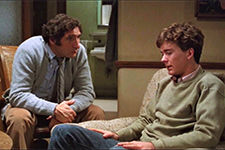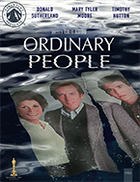Ordinary People
|  Robert Redford’s directorial debut, Ordinary People, is a solemn, studied portrait of a well-to-do American family coming apart from the inside after the tragic death of a son. Based the popular 1976 novel by Judith Guest, its central idea is that all families have inner crises that remain unspoken until something forces them out into the open, which is the true test of the family’s strength and cohesion. Repression reigns in the suburban streets of middle-class America, something the film pushes home again and again. Most of the narrative is told through the eyes of Conrad (Timothy Hutton), the surviving son of Calvin (Donald Sutherland) and Beth (Mary Tyler Moore) Jarrett, upper-class, well-connected people in the wealthy Chicago suburb of Lake Forrest. But, wealth and social connections are essentially meaningless to Conrad, as he is tormented by guilt because he was with his older brother Buck when he drowned in a boating accident. Conrad’s survivor guilt is so intense that he tried to kill himself and has just recently been released from a four-month stay at a psychiatric hospital where he received electroshock therapy (numerous people mention how good he looks now that his hair has grown back). Back in high school, he is something of an outcast, and the long, vertical scars on his wrist remain as harsh reminder. The death of Conrad’s older brother has literally shattered his family, driving decisive wedges between him and his parents. Calvin, the father, is a kind, but awkward man, a tax attorney who is a great success in the business world, but has trouble communicating with his own son. Conrad’s mother, Beth, is a different story altogether. On the surface, she is the perfect suburban housewife—polished and refined like a fine piece of jewelry—but she is also as cold and hard. Quick flashbacks give the obvious impression that Buck was her favorite son, and she is simply incapable of showing Conrad the kind of affection he so desperately needs because deep inside she harbors an anger toward him because he lived and Buck didn’t. When she is accused at one point of not loving him, she blurts out, “Mothers can’t not love their sons,” yet the film makes it clear that this is essentially the case. The best scenes in Ordinary People are the ones between Conrad and Beth, as Redford conveys a disturbingly palpable gap between them. Conrad says to his endearing psychiatrist, Dr. Berger (Judd Hirsch), “We just don’t connect,” but there is something deeper to it. It is as if they exist on different planes, with Conrad constantly reaching out and Beth unable—or unwilling—to meet him. There is one scene in particular, when Calvin is taking family photographs and wants Beth to pose with Conrad. He has trouble getting the camera to work, and Beth becomes agitated—not with Calvin’s awkwardness with the camera, but with the fact that she has to stand next to Conrad and smile as if everything is okay. She literally cannot stand to be next to him in that manner (or any other manner really), and what makes the scene so painful is that Conrad can sense her aloofness around him, and he reacts violently. The screenplay by Alvin Sargent (Paper Moon, Julia) is filled with good scenes that convey in recognizable detail the often painful scope of distraught family relations. Sargent is especially good at giving the characters a deep, often contradictory resonance. Again, Beth is a perfect example, as her unmotherly behavior would seem to dictate that she be viewed in purely negative terms, yet she is a wholly sympathetic character. We realize that her behavior is not borne out of willful choices, but out of her own limitations. She is, essentially, a weak person, and she cannot deal with the tragedy life has dealt her. Instead, she turns her back on it; but, in the process, she also turns her back on those who need her. The film’s most enduring quality is its ability to show us how the characters change as their lives progress over one autumn and winter season. In more specific terms, it is Conrad whose characters goes through the most change, as he slowly regains his confidence in himself and his life. Timothy Hutton won an Oscar for best supporting actor, and it is not surprising, even given his young age at the time, because he goes through so many moods and stages of growth. He morphs from a frightened and suicidal young man, to one who might just make it, and he is completely convincing throughout. Yet, Ordinary People is, in many ways, a flawed portrait, an obvious directorial debut that fumbles in a few crucial areas. Redford is great at working with the actors—Sutherland, Moore, Hutton, and Hirsch all give outstanding performances, as do Elizabeth McGovern and Dinah Manoff in crucial supporting roles as girls in Conrad’s life who affect his recovery—but his visual style is too understated and serene. He is obviously trying to make a deeply serious film, but that sometimes gets the better of him, as his compositions and pacing can be slightly stilted and overly formal. Some of it is not Redford’s fault, especially the expository nature of the material that is nearly unavoidable whenever a large part of the story relies on scenes involving characters spilling their emotions to psychiatrists. Judd Hirsch does a wonderful job as Dr. Berger, yet it is hard to get over the feeling that he is there as little more than a narrative device to allow for Conrad and eventually his father to explicate precisely what they are feeling. There are also several unnecessary flashback sequences that spell out too plainly what is already fairly obvious—this is especially the case of an awkward flashback in which Calvin remembers dancing with Beth when they were young, a scene that could have easily been left on the editing room floor. Still, despite its flaws, Ordinary People is a powerful depiction of the damage done when human beings can no longer communicate with those closest to them.
Copyright © 2022 James Kendrick Thoughts? E-mail James Kendrick All images copyright © Paramount Home Entertainment | |||||||||||||||||||||||||||||
Overall Rating: 


 (3.5)
(3.5)


